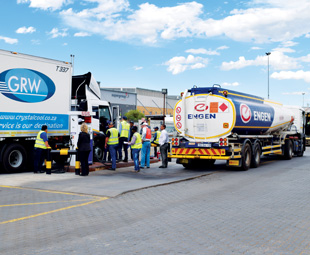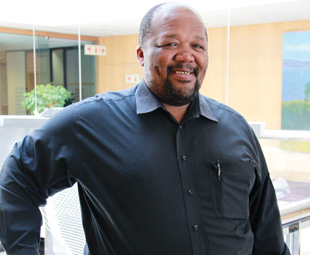Passionate about petroleum

Mendo Joxo, national operations manager at Engen, has only ever worked in the local petroleum industry. FOCUS finds out more about him.
Joxo, a chemical engineer with a postgraduate diploma in business administration, studied in the United Kingdom at Loughborough University. He then obtained a postgraduate diploma through the University of Wales, at what was then known as Technikon Natal.
“I started work at Anglo American as a graduate trainee at the colliery in Witbank. Thereafter, I joined the National Petroleum Refiners of South Africa (Natref) in Sasolburg, where I worked as a process engineer for three years.
“I then moved to the South African Petroleum Refineries (Sapref) as a senior product engineer, in a joint venture between BP and Shell in Durban,” he recalls. It was here that Joxo was promoted to the position of plant unit manager.
He then joined Petro SA in Mossel Bay as a shutdown and turnaround manager – looking after maintenance of the plant during a total outage of the plant. “I was there for four years, after which I joined Shell as an area distribution manager for South Africa from 2008 until the end of 2013. In March 2014, I joined Engen,” Joxo adds.
 Now, he looks after Engen’s fleet of vehicles, which comprises roughly 170 trucks and trailers, as well as all third-party contractors that are working for Engen as hauliers or transporters. “I also look after the whole depot network in South Africa, Lesotho and Swaziland. I’m often out and about at the 26 depots, as I have to be hands-on.”
Now, he looks after Engen’s fleet of vehicles, which comprises roughly 170 trucks and trailers, as well as all third-party contractors that are working for Engen as hauliers or transporters. “I also look after the whole depot network in South Africa, Lesotho and Swaziland. I’m often out and about at the 26 depots, as I have to be hands-on.”
During an average week, Joxo visits at least one depot. He adds: “Then I have meetings. I am engaged in forecasting and at a strategic level. There are five elements with which I drive the business: safety first; fix and reset; getting the basics right; develop; and finally, nurturing people – we have an academy where we train employees and try to ‘sharpen up’ their competencies.”
Joxo says that, without a doubt, the highlight of his career has been leading an efficiency turnaround at Engen. “When I arrived, the fleet was not being employed optimally. Over the past two years we have achieved just over a 25 percent improvement in efficiency. My goal is to get that figure up a further 15 percent by the end of 2016,” he explains.
In the early stages of his career, Joxo wasn’t really so keen on being a manager – he was more interested in the technical aspects of chemical engineering. “In the technical field, you need tenacity, good attention to detail, and a thick skin. The job is full of surprises and you have to look at the small things that could go wrong, so that you can make sure that the culture of excellence is upheld. You need to be vigilant at all times. That is how I approach my job,” he elaborates.
However, there’s more to the man than just his job. Joxo is also a family man. “I have two sons and a daughter. The eldest works for Eskom as a mechanical engineer. The middle one is studying computer science and business at Monash University, and the youngest is studying psychology at the University of Cape Town,” he says with pride.
Joxo lives in Johannesburg with his wife. “I’m generally a family man on the weekends – I like to spend time with my wife, and I also enjoy sport. Every week I’m away for at least two nights, so I really try to be at home on the weekends.”
His cellphone stays on at all times, however, so that, if there is an emergency, he can guide the recovery process. “When an issue occurs, you need to make sure all the most appropriate help is mobilised, and stay in touch to make sure that everything is handled in accordance with our stringent safety, health, environment and quality (SHEQ) practices.
“Engen plays an integral part in securing the energy needs of South Africa, ensuring the continued supply of fuel to the citizens of the country, whilst never compromising the safety of our employees and the surrounding communities. As a company, Engen is proud of the world-class standards and guidelines that govern our SHEQ practices.
“When there is an incident, it is imperative that correct procedure is followed and that the right people respond. We also need to anticipate and respond to any questions that may arise from the media, and ensure that the corporate department has the most accurate information possible about the incident,” he concludes.
Published by
Focus on Transport
focusmagsa




